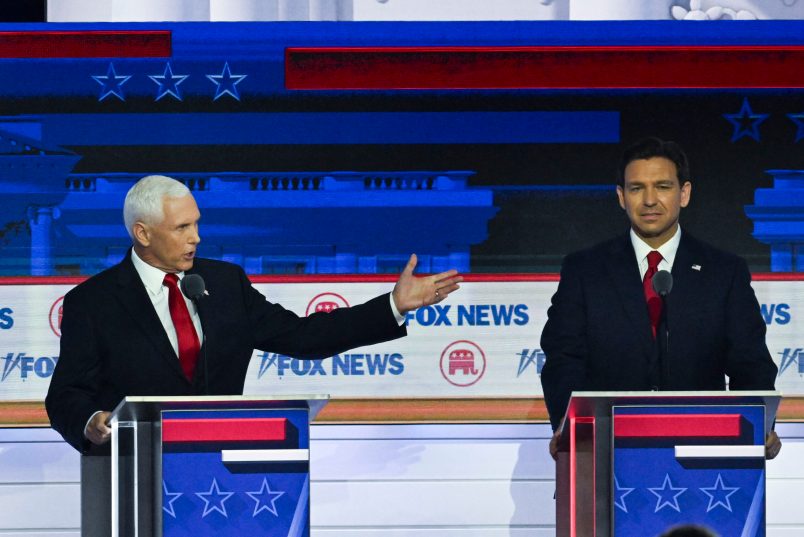I want to return to the topic Nicole LaFond wrote about in yesterday’s column. Senate Republicans spent the day last week getting a detailed polling brief explaining (and searching for a solution to) how it is the public got the idea that “pro-life” politicians want to ban abortion. Who is responsible for this terrible misunderstanding?
I hesitate to use the term “gaslighting” because it’s become so ubiquitous and overused in our culture. Even that phrase doesn’t quite capture it, a shift that is somehow both instant and glacial — a kind of policy moonwalk in which the evacuees are so stunned and disoriented it’s not always clear whether they’re fooling their marks or themselves. It now seems clear that the only thing that will be at all memorable about the GOP’s first presidential debate of the 2024 cycle on August 23rd will be that brief speech from Mike Pence in which he staked his campaign on his bible-rooted, evangelical, pro-life record and endorsed a 15-week national ban.
I remember finding it stunning in the moment. Kate Riga took it up the next day. The U.S. doesn’t keep perfect data on abortion care in the United States. The most readily available numbers look at the number of abortions on or before the 13th week (91.1%) and 21st week (98.7%). Even this anti-abortion rights group says that 6% of abortions take place on or after week 15, for instance. It is likely that roughly 95% of abortions in the United States happen within the 15-week window that dyed-in-the-wool pro-life politicians now claim to endorse. If the most diehard of pro-life evangelical politicians are now willing to concede 95% of abortions in the U.S., it’s as though they never meant the whole decades long argument in the first place.
It’s probably best to see Pence’s statement, all the more telling and striking for how comparatively little attention it attracted, as marking the end of the “Pro-Life” movement itself. Of course, this doesn’t mean that the fight for abortion rights is over. Far from it. Abortion rights are more restricted today than at any time in the last half century. Indeed, even the proposed 15-week “national” ban turns out to be a clever sham. It’s not a uniform standard to apply across the United States. It leaves all the draconian red-state bans in place. It’s simply a national “maximum,” a kind of freebie ban Republicans and pro-lifers can get in blue states for nothing in return. But Republicans who have made pro-life politics a sheet anchor of Republican campaigns for four decades now seem unwilling to make any affirmative case for their notional position.
Indeed, it’s not just politicians, who by definition will usually move with public opinion. Even many pro-life ideologues are now proposing comparable bans as a way to at least halt the hemorrhaging of support for pro-life policies or simply batten down behind gerrymandered legislatures and an all-out push to prevent as many state referenda as possible. As Patrick T. Brown put it somewhat optimistically, pro-life governors can win elections after signing draconian abortion bans. (In other words, when it’s packaged in with countless other issues voters care about.) The problem is that “the pro-choice side beats the pro-life side when the issue is heads-up in the ballot box.” The fact that Pence, running in a Republican primary felt it necessary to endorse the national 15 week ban suggests that the evolving reality of post-Dobbs politics makes even Brown’s argument about avoiding “heads-up” votes outdated.
Movements that can’t make positive arguments for their favored positions, even to friendly audiences, cease to be political movements properly understood and become something more like rearguard actions. They seek to use inertia, incumbency and stratagems to hold on to gains and do their best to avoid fights on the open ground of public opinion where at least incremental losses seem inevitable. That’s where anti-abortion, “pro-life” politics stands on the eve of the 2024 election.


